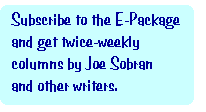Author’s Introduction (December 2007)
   At
a time when Ron Paul appears to be poised to launch a presidential
“insurgency-candidacy,” it is helpful to examine earlier
examples of this phenomenon. Buchanan’s 1992 candidacy occurred
before the rise of the Internet as a mass medium. Nevertheless, a populist
opposition to the recession of the early 1990s had a resonance at least
somewhat comparable to that of opposition to the war in Iraq today. When in
1992 it appeared that Buchanan might actually win the Republican
nomination, the result was an unrelenting firestorm of media and
establishment Republican criticism that effectively ended his chances of
success. However, the following column accurately predicted that
Buchanan’s insurgency-candidacy had probably compromised
George H.W. Bush’s chances in the November 1992
U.S. presidential election. At
a time when Ron Paul appears to be poised to launch a presidential
“insurgency-candidacy,” it is helpful to examine earlier
examples of this phenomenon. Buchanan’s 1992 candidacy occurred
before the rise of the Internet as a mass medium. Nevertheless, a populist
opposition to the recession of the early 1990s had a resonance at least
somewhat comparable to that of opposition to the war in Iraq today. When in
1992 it appeared that Buchanan might actually win the Republican
nomination, the result was an unrelenting firestorm of media and
establishment Republican criticism that effectively ended his chances of
success. However, the following column accurately predicted that
Buchanan’s insurgency-candidacy had probably compromised
George H.W. Bush’s chances in the November 1992
U.S. presidential election.
Bush Critically Wounded by Buchanan
Candidacy?
(February 1992)
 The 1992 American nomination
process is producing a large number of political surprises, among
them, the emergence of Pat Buchanan as a serious contender against
President Bush. Further surprises may yet be in store, for example, the late
entry of [Mario] Cuomo or the continued strength of [Paul] Tsongas [senator
from Massachusetts], the anti-candidate candidate. Tsongas looks like a
decent, somewhat naive man of principle, with little charisma or
understanding of how sleazy the political process actually is. Buchanan, in his
own way, is an anti-politician politician as well. The 1992 American nomination
process is producing a large number of political surprises, among
them, the emergence of Pat Buchanan as a serious contender against
President Bush. Further surprises may yet be in store, for example, the late
entry of [Mario] Cuomo or the continued strength of [Paul] Tsongas [senator
from Massachusetts], the anti-candidate candidate. Tsongas looks like a
decent, somewhat naive man of principle, with little charisma or
understanding of how sleazy the political process actually is. Buchanan, in his
own way, is an anti-politician politician as well.
  It
is interesting to speculate to what extent class and religious dynamics play a role in Buchanan’s
campaign against Bush: Buchanan as the working-class Catholic and Irish
outsider; Bush as the effete, WASP patrician of the Eastern Establishment.
Bush’s prissy speech compares unfavorably to Buchanan’s
fiery — if controversial — declamation. A deep antagonism is
apparent in Buchanan’s use of the phrase “King George”
— an antagonism drawn from the decades-long exclusion by the WASP
elites of Catholics, white ethnics, and the white Protestant working-classes
from positions of serious power. It
is interesting to speculate to what extent class and religious dynamics play a role in Buchanan’s
campaign against Bush: Buchanan as the working-class Catholic and Irish
outsider; Bush as the effete, WASP patrician of the Eastern Establishment.
Bush’s prissy speech compares unfavorably to Buchanan’s
fiery — if controversial — declamation. A deep antagonism is
apparent in Buchanan’s use of the phrase “King George”
— an antagonism drawn from the decades-long exclusion by the WASP
elites of Catholics, white ethnics, and the white Protestant working-classes
from positions of serious power.
 Buchanan’s protectionist politics, fighting words, and
populist style are akin in spirit to the early union and populist movements of
America, their sufferings from the exactions of WASP plutocrats, and their
resistance to “the social superiors who know better how to organize
and rule the country.” Buchanan despises country-club Republicans
and the elite of the Republican party, who, in his opinion, have sold out
heartland America. Buchanan’s protectionist politics, fighting words, and
populist style are akin in spirit to the early union and populist movements of
America, their sufferings from the exactions of WASP plutocrats, and their
resistance to “the social superiors who know better how to organize
and rule the country.” Buchanan despises country-club Republicans
and the elite of the Republican party, who, in his opinion, have sold out
heartland America.
![[Breaker quote for The Class Dynamics of Buchanan in the 1992 Primaries: Looking back at Buchanan in 1992]](2007breakers/mw071228.gif)  Buchanan’s
strong showing has critically wounded Bush, even if he finishes the nomination process a winner. Poll
results continue to see Bush’s popularity in free-fall. To think that a
controversial commentator could seriously challenge the nomination of an
incumbent president, who once enjoyed a 90 percent approval rating, throws
into question Bush’s chances in November. What can his credibility
with the American people be, if his own Republicans are in virtual revolt? If
Bush wins the hard-fought nomination, his Democratic contenders can
leverage this to great benefit. Buchanan’s
strong showing has critically wounded Bush, even if he finishes the nomination process a winner. Poll
results continue to see Bush’s popularity in free-fall. To think that a
controversial commentator could seriously challenge the nomination of an
incumbent president, who once enjoyed a 90 percent approval rating, throws
into question Bush’s chances in November. What can his credibility
with the American people be, if his own Republicans are in virtual revolt? If
Bush wins the hard-fought nomination, his Democratic contenders can
leverage this to great benefit.
 Ironically, the situation is such that Bush will have less of a
chance of winning the presidency, coming out of a hard-fought nomination
fight, than Buchanan might. The momentum of Buchanan’s historic
overturning of an incumbent president would be worth more in the
presidential campaign than Bush’s uninspired ability — backed by
all the resources of the Republican Party leadership and various friends in
the media — to quash the incipient “Middle American
revolution.” Ironically, the situation is such that Bush will have less of a
chance of winning the presidency, coming out of a hard-fought nomination
fight, than Buchanan might. The momentum of Buchanan’s historic
overturning of an incumbent president would be worth more in the
presidential campaign than Bush’s uninspired ability — backed by
all the resources of the Republican Party leadership and various friends in
the media — to quash the incipient “Middle American
revolution.”
 It is already too late for Bush’s advisors to advance the
argument that potential Buchanan supporters should rally behind the
electable candidate. Buchanan’s candidacy has inflicted an enormous
amount of damage and reduced Bush’s presidential chances
considerably. If Bush wins the nomination, the Democrats will have Buchanan
to thank for almost certainly handing them the real victory in November.
However, if Buchanan somehow wins the nomination, the race will be wide
open. It is already too late for Bush’s advisors to advance the
argument that potential Buchanan supporters should rally behind the
electable candidate. Buchanan’s candidacy has inflicted an enormous
amount of damage and reduced Bush’s presidential chances
considerably. If Bush wins the nomination, the Democrats will have Buchanan
to thank for almost certainly handing them the real victory in November.
However, if Buchanan somehow wins the nomination, the race will be wide
open.
 A presidential campaign involving Buchanan versus Tsongas
would be so much more interesting and invigorating to the American political
process, and the over-all health of American democracy, than a “no-issues-please”
contest between George Bush and William Clinton. A presidential campaign involving Buchanan versus Tsongas
would be so much more interesting and invigorating to the American political
process, and the over-all health of American democracy, than a “no-issues-please”
contest between George Bush and William Clinton.
Mark Wegierski
|



![[Breaker quote for The Class Dynamics of Buchanan in the 1992 Primaries: Looking back at Buchanan in 1992]](2007breakers/mw071228.gif)